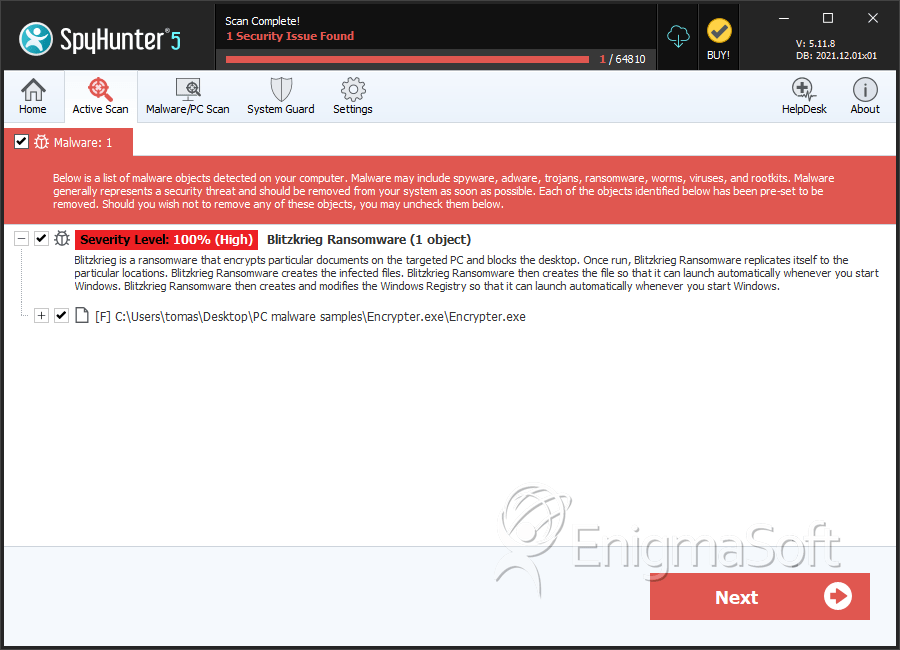Blitzkrieg Ransomware
Threat Scorecard
EnigmaSoft Threat Scorecard
EnigmaSoft Threat Scorecards are assessment reports for different malware threats which have been collected and analyzed by our research team. EnigmaSoft Threat Scorecards evaluate and rank threats using several metrics including real-world and potential risk factors, trends, frequency, prevalence, and persistence. EnigmaSoft Threat Scorecards are updated regularly based on our research data and metrics and are useful for a wide range of computer users, from end users seeking solutions to remove malware from their systems to security experts analyzing threats.
EnigmaSoft Threat Scorecards display a variety of useful information, including:
Ranking: The ranking of a particular threat in EnigmaSoft’s Threat Database.
Severity Level: The determined severity level of an object, represented numerically, based on our risk modeling process and research, as explained in our Threat Assessment Criteria.
Infected Computers: The number of confirmed and suspected cases of a particular threat detected on infected computers as reported by SpyHunter.
See also Threat Assessment Criteria.
| Threat Level: | 100 % (High) |
| Infected Computers: | 20 |
| First Seen: | December 3, 2015 |
| Last Seen: | September 10, 2021 |
| OS(es) Affected: | Windows |
The Blitzkrieg Ransomware is a newly discovered data-encrypting Trojan, which emerged at the beginning of May 2019. The Blitzkrieg Ransomware appears to be a separate project, as it is not recognized as a variant of any of the popular ransomware threats such as the Dharma Ransomware or the STOP Ransomware.
It is likely that the Blitzkrieg Ransomware is being propagated by pirated software, mass spam email campaigns containing a corrupted attachment, and fraudulent software updates. When the Blitzkrieg Ransomware infiltrates your PC, it would quickly begin scanning all the data that is stored on your system. Once it concludes the scan and identifies all the files it will target, the Blitzkrieg Ransomware would start the encryption process. This step of the attack would leave the data unusable. After locking your files, the Blitzkrieg Ransomware adds a new file extension to them - '.bkc.' In case you were wondering, this means that if you had saved a picture called 'Spain-holiday.jpeg,' the Blitzkrieg Ransomware will alter it to 'Spain-holiday.jpeg.bkc' and you will be unable to open it or use it in any manner. In the next step of the attack, the Blitzkrieg Ransomware drops its ransom note, which is called 'HowToBackFiles.txt.' The authors of the Blitzkrieg Ransomware fail to mention what the ransom fee they would require. However, they give out an email address where the victim is supposed to get in touch to receive further information on how to pay and then, supposedly, unlock their data. The email listed is 'Blitzkriegpc@protonmail.com'.
We would strongly suggest you to avoid contacting or attempting to negotiate with cybercriminals. They are not to be trusted. It is very likely that they would lead you to believe that if you pay up, they will restore your data. More often than not, however, these are mere lies, and you may not receive the decryptor they promise even if you give them the money they want. What you should do, instead, is install a legitimate anti-spyware tool and have it rid you of the Blitzkrieg Ransomware. You also can attempt to retrieve some of the data lost via a third-party file-recovery application.
SpyHunter Detects & Remove Blitzkrieg Ransomware

File System Details
| # | File Name | MD5 |
Detections
Detections: The number of confirmed and suspected cases of a particular threat detected on
infected computers as reported by SpyHunter.
|
|---|---|---|---|
| 1. | Encrypter.exe | e48067d2ad6adcbf2e4cf7e705d4bd82 | 10 |

